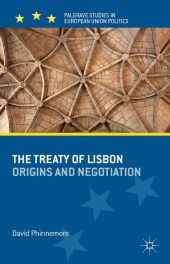 Neuerscheinungen 2013Stand: 2020-01-07 |
Schnellsuche
ISBN/Stichwort/Autor
|
Herderstraße 10
10625 Berlin
Tel.: 030 315 714 16
Fax 030 315 714 14
info@buchspektrum.de |

D. Phinnemore
The Treaty of Lisbon
Origins and Negotiation
1st ed. 2013. 2013. x, 306 S. 216 mm
Verlag/Jahr: SPRINGER PALGRAVE MACMILLAN; PALGRAVE MACMILLAN UK 2013
ISBN: 1-349-31793-4 (1349317934)
Neue ISBN: 978-1-349-31793-6 (9781349317936)
Preis und Lieferzeit: Bitte klicken
Detailed and comprehensive analysis of how the Treaty of Lisbon emerged in 2007 this book explores the role played by the German Council Presidency and the EU´s institutional actors in securing agreement among the leaders of member states on an intergovernmental conference as well as a new treaty text to replace the rejected Constitutional Treaty.
List of Boxes Abbreviations Acknowledgements 1. The Treaty of Lisbon in Context 2. The Constitutional Treaty: Rejection and Reflection 3. The German Council Presidency I: Focal Points and Reverse Engineering 4. The German Council Presidency II: From Berlin Declaration to Road Map 5. The German Council Presidency III: From Road Map to Mandate 6. The IGC Mandate and the Draft Reform Treaty 7. The 2007 Intergovernmental Conference 8. Ratification and Implementation 9. The Treaty of Lisbon and the Future of EU Treaty Reform References Index
´This fine-grained volume chronicles the complex processes leading to the Treaty of Lisbon. It provides an essential background to the continuing debate on EU treaty reform.´
Helen Wallace, European Institute, London School of Economics and Political Science, UK
´Phinnemore has produced what will undoubtedly be seen as the definite account of how the Lisbon Treaty has come about. The volume is a detailed and extremely valuable record of how the provisions in the treaty were negotiated, demonstrating the way in which various interests and particular circumstances have interacted in bringing about this important reform. Beyond this, Phinnemore identifies the lessons that can be drawn from the Lisbon experience and the more general patterns that explain the outcomes of treaty revision. This book ought to be standard reading for anyone seeking to understand the complex processes that underpin decision-making in the European Union.´
Thomas Christiansen, Department of Political Science, University of Maastricht, The Netherlands
David Phinnemore is Professor of European Politics at Queen´s University Belfast, Northern Ireland and Visiting Professor at the College of Europe in Bruges. He has published widely on a range of EU issues, notably treaties and treaty reform, enlargement, external relations, particularly association, and Romania´s position within European integration.


